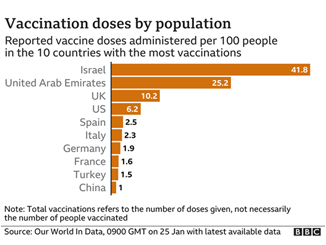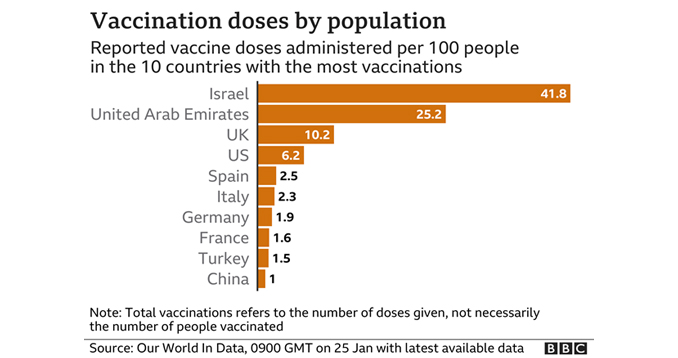

Africa is in danger of being left behind in the rollout of COVID-19 vaccines as countries in other regions strike bilateral deals, thus driving up prices, the World Health Organization (WHO) warned on Thursday.
Although vaccines have been administered in 50 wealthier nations, Guinea is the sole low-income country on the continent to receive doses, with only 25 people being inoculated so far. Meanwhile, Seychelles is the only African country to start a national vaccination campaign.
“We first, not me first, is the only way to end the pandemic. Vaccine hoarding will only prolong the ordeal and delay Africa’s recovery. It is deeply unjust that the most vulnerable Africans are forced to wait for vaccines while lower-risk groups in rich countries are made safe”, said Dr Matshidiso Moeti, WHO Regional Director for Africa.
“Health workers and vulnerable people in Africa need urgent access to safe and effective COVID-19 vaccines.”
An international coalition known as the COVAX Facility was established to ensure all countries will have equal access to any vaccines against the new coronavirus disease.
It is co-led by the Coalition for Epidemic Preparedness Innovations (CEPI), Gavi, the Vaccine Alliance, and WHO.
The COVAX Facility has secured two billion doses of vaccine from five producers, with options for over one billion more. Delivery is set to begin soon, according to Thabani Maphosa, Managing Director, Country Programmes at GAVI.
“This massive international undertaking has been made possible thanks to donations, work towards dose-sharing deals and deals with manufacturers that have brought us to almost two billion doses secured. We look forward to rollout in the coming weeks”, he said.
COVAX has committed to vaccinating at least 20 per cent of the population in Africa by the end of this year.
Priority will be given to health workers and other vulnerable groups, such as older persons and those with pre-existing health conditions.
An initial 30 million vaccine doses are expected to begin arriving in countries by March. Overall, a maximum of 600 million doses will be disbursed, based on two doses per person.
WHO said timelines and quantities could change, for example if vaccines fail to meet regulatory approval or due to challenges related to production, delivery and funding.
Israel has the Highest Rate of Vaccines While Palestinians Suffer
Israel has the highest rate of Covid-19 vaccination per person in the world while the Palestinian territories continue
So what is the situation in the West Bank and Gaza – regarded as occupied territories by the international community – and why are they not vaccinating people against coronavirus? How many Israelis and Palestinians have been vaccinated? More than a quarter of Israel’s population of nine million have received at least one dose of the Pfizer vaccine since 19 December, its health ministry says.
The programme started with elderly people and others considered at high risk, but people aged 40 and over can also now get the jab. Israel leads the world in terms of the number of doses per head of population.
However, with the exception of those in East Jerusalem, no-one in the Palestinian areas has started receiving Covid vaccines. All Palestinians in occupied East Jerusalem are entitled to be vaccinated against Covid by Israel, as are medics working at the six Palestinian hospitals there – many of whom come from other parts of the West Bank and Gaza.
This is because Palestinians in East Jerusalem have Israeli residency status – so those living there pay Israeli taxes and have access to Israeli health insurance. According to the latest World Health Organization (WHO) data, there have been nearly 175,000 confirmed coronavirus cases and more than 1,960 deaths among Palestinians in the West Bank, East Jerusalem and Gaza.
The case fatality rate for these areas is 1.1% – that’s the proportion of reported infections which result in a person dying. In Israel, it is 0.7%, according to WHO data.

Leave a Reply